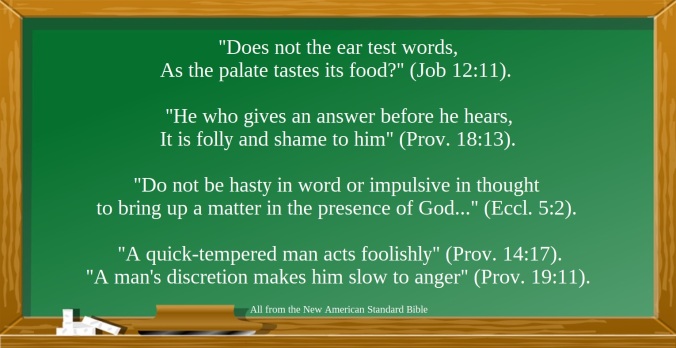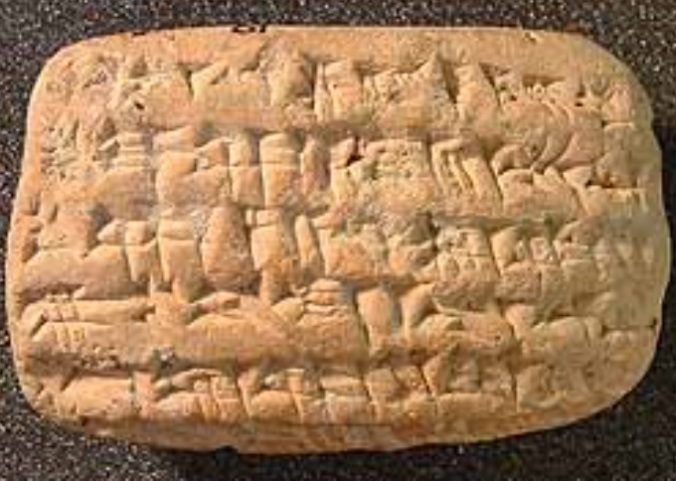“Go therefore and make disciples of all the nations…teaching them to observe all that I commanded you; and lo, I am with you always, even to the end of the age” (Matt. 28:19-20).
——————–
Contents:
1) If Baptism Is Not Necessary (Irven Himmel)
2) Toward Better Communication (Sewell Hall)
——————–

-1-
If Baptism Is Not Necessary
Irven Himmel
In the thinking of many religionists baptism is no more than a ritual. Its meaning is explained in a variety of ways, and to some it has no real meaning. While there is widespread agreement that water is the element prescribed in the New Testament for baptism, few acknowledge that baptism is necessary to the obtaining of forgiveness of sins.
If Baptism Is Not Necessary,
Why Did Jesus Make It a Condition of Salvation?
After instructing the apostles to preach the gospel to every creature, the Lord said, “He that believeth and is baptized shall be saved; but he that believeth not shall be damned” (Mk. 16:15, 16). Note that Jesus did not say, “He that believeth and is not baptized shall be saved.” And He did not say, “He that believeth shall be saved whether he is baptized or not.” To the contrary, Jesus said, “He that believeth and Is baptized shall be saved.”
On another occasion Jesus said, “Therefore whosoever heareth these sayings of mine, and doeth them, I will liken him unto a wise man . . .” (Matt. 7:24). This makes both hearing and doing essential to our being like a wise man. In like manner, Mk. 16:16 makes both belief and baptism essential to our being saved. Hearing without doing does not make one wise, and belief without baptism does not result in salvation. If two and two make four, two minus two cannot equal four. Belief and baptism must not be interpreted to mean belief minus baptism.
If Baptism Is Not Necessary,
Why Did Peter Teach That It Is For the Remission of Sins?
On Pentecost, Peter preached that Jesus is both Lord and Christ. His hearers, pricked in their heart with conviction, asked what to do. Peter replied, “Repent, and be baptized every one of you in the name of Jesus Christ for the remission of sins, and ye shall receive the gift of the Holy Ghost” (Acts 2:38). How can one admit that repentance is for (unto) the remission of sins but deny that baptism is for that purpose?
When Peter said in Acts 3:19, “Repent ye therefore and be converted, that your sins may be blotted out,” no one takes that to mean that repentance is necessary but being converted is non-essential. If Acts 3:19 makes both repentance and being converted necessary to blotting out of sins, Acts 2:38 makes both repentance and baptism necessary to remission of sins.
A disciple named Ananias was sent to Saul, a praying penitent man, in Damascus. “And now why tarriest thou?” said Ananias “arise, and be baptized, and wash away thy sins, calling on the name, of the Lord” (Acts 22:16). Were Saul’s sins already washed away? If so, why was he told to “wash away thy sins”?
It will not help to say this washing was symbolic. One might as well argue that the arising was symbolic rather than real, or that the baptism was symbolic rather than actual, or that the calling on the Lord was only symbolic rather than genuine calling, as to contend that the washing away of sins was only a symbolic portrayal. The language of Ananias clearly implies that Saul was still a sinner until he was baptized.
If Baptism Is Not Necessary,
Why Did Paul Regard it As A Prerequisite for the New Life?
Paul wrote, “Know ye not, that so many of us as were baptized into Jesus Christ were baptized into his death? Therefore we are buried with him by baptism into death: that like as Christ was raised up from the dead by the glory of the Father, even so we also should walk in newness of life” (Rom. 6:3, 4).
Baptism stands between the sinner and his entrance into Jesus Christ. Baptism puts one into Jesus Christ. And baptism puts one into the death of the Lord where the benefits of His shed blood are to be received. Furthermore, baptism enables one to enter into “newness of life.” The theory of salvation before baptism would have one walking in newness of life before the old man is buried.
If Baptism Is Not Necessary,
Why Does the Bible Say That It Saves?
According to the apostle Peter, “eight souls were saved by water” in Noah’s day. The water saved them in that it carried the ark with its occupants from the old sin-cursed world to a new beginning. “The like figure whereunto even baptism doth also now save us (not the putting away of the filth of the flesh, but the answer of a good conscience toward God,) by the resurrection of Jesus Christ” (1 Pet. 3:21).
Baptism doth now save us by the resurrection of Jesus Christ! That is the gist of Peter’s statement. Just as water “saved” eight people who were in the ark, baptism “doth also now save us.” Many argue that baptism doth NOT save us. Peter said baptism doth NOW save us. Which do you accept, the teaching of the Bible, or the teaching of fallible men?
Reader, if you have not obeyed the Lord in baptism for the remission of sins, do it today.
— Via Truth Magazine XX: 45, p. 706, November 11, 1976
——————–

-2-
Toward Better Communication
Sewell Hall
“This you know, my beloved brethren. But let everyone be quick to hear, slow to speak and slow to anger, for the anger of man does not achieve the righteousness of God” (James 1:19-20).
Can you imagine better advice for getting along with others? How often we hear it said that the problem in a family, a plant, an office, a school, or even a church is a breakdown of communication. Obedience to this verse would change all of that.
“Be quick to hear.” Listen! Try to understand where the one who is talking “is coming from” and what he or she really means. See if you can repeat what was said so accurately that the one who said it will agree that you have stated the position accurately.
Now, make sure a reply is needed. We do not have to correct every mistake we hear. Some are not serious enough to require attention. Others, though serious, may have to wait for a more suitable time to be corrected.
Even if a reply is needed, take your time. “Be slow to speak.” Think of what you are saying. Think how it will sound to the one hearing it and how it will sound if it is repeated to someone else. Ask yourself if what you are about to say will do good or do harm. Ask God to help you to say only what needs to be said. Nehemiah was asked a question by the king and managed a prayer before he answered (Neh. 2:4-5). Remember that once you have spoken, you cannot recall your words.
Above all, “be slow to anger.” Anger almost always breaks down communication; shouting matches seldom end in a better understanding of each other. And, besides jeopardizing human relationships, they endanger our relation with God. We may fancy that our anger is “righteous indignation,” but the Holy Spirit says: “The anger of man does not achieve the righteousness of God.”
Are you thinking, “That’s not much of a way to win an argument”? RIGHT! But it is a pretty good way to stop one. How would you like to argue with someone who is “quick to hear, slow to speak, and slow to anger”?
— Via The Beacon, July 14, 2019
——————–
The Steps That Lead to Eternal Salvation
1) Hear the gospel, for that is how faith comes (Rom. 10:17; John 20:30-31).
2) Believe in the deity of Christ (John 8:24; John 3:18).
3) Repent of sins (Luke 13:5; Acts 17:30).
4) Confess faith in Christ (Rom. 10:9-10; Acts 8:36-38).
5) Be baptized in water for the remission of sins (Mark 16:16; Acts 2:38; 22:16; Rom. 6:3-4; Gal. 3:26-27; 1 Pet. 3:21).
6) Continue in the faith, living for the Lord; for, if not, salvation can be lost (Heb. 10:36-39; Rev. 2:10; 2 Pet. 2:20-22).
——————–
Tebeau Street
CHURCH OF CHRIST
1402 Tebeau Street, Waycross, GA 31501
Sunday services: 9:00 a.m. (Bible class); 10 a.m. & 5 p.m. (worship)
Wednesday: 7 p.m. (Bible class)
evangelist/editor: Tom Edwards (912) 281-9917
Tom@ThomasTEdwards.com
http://thomastedwards.com/go (Older version of Gospel Observer website without pictures, but back to March 1990)
http://tebeaustreetchurchofchrist.org/
http://ThomasTEdwards.com/audioser.html (audio sermons)






